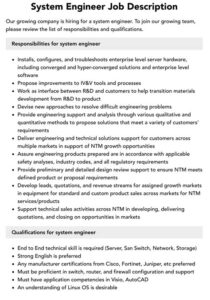Explore the University of Pennsylvania Systems Engineering program, including curriculum, research opportunities, career outcomes, and why it’s the top choice for aspiring engineers.Unlock your potential with the University of Pennsylvania’s esteemed Systems Engineering program, a gateway to innovative problem-solving and strategic thinking in today’s complex world. Renowned for its rigorous curriculum and interdisciplinary approach, this program prepares graduates for impactful careers across various industries by merging technical expertise with practical applications. At Penn, students delve into the foundational principles of systems engineering through core courses that foster a collaborative learning environment. Additionally, the program offers prolific research opportunities, allowing students to engage in pioneering projects alongside experienced faculty. By choosing the University of Pennsylvania for your systems engineering education, you’ll not only gain invaluable knowledge but also become part of a vibrant alumni network that champions real-world success. Discover how this program can transform your career path and provide you with the skills needed to excel in a rapidly evolving landscape.
Overview Of Systems Engineering At The University Of Pennsylvania
The University of Pennsylvania offers a comprehensive and robust program in Systems Engineering that is designed to prepare students for the complexities of modern engineering and management challenges. This interdisciplinary field integrates principles from various disciplines such as engineering, computer science, and management, focusing on creating and managing complex systems over their life cycles. The curriculum emphasizes a practical approach, ensuring that graduates possess the essential knowledge and skills required to tackle real-world problems.
At the University of Pennsylvania, the Systems Engineering program is known for its collaborative environment, where students can work on team projects that simulate industry scenarios. This hands-on learning experience is complemented by access to cutting-edge research facilities and resources, enabling students to engage in innovative solutions across various sectors, including robotics, healthcare, logistics, and telecommunications.
Moreover, the program aligns with industry standards and incorporates feedback from leading professionals, ensuring that the curriculum remains relevant and effective. Graduates of the Systems Engineering program at the University of Pennsylvania emerge well-prepared to meet the demands of the workforce, equipped with a strong foundation in system design, analysis, and implementation.
Input: Core Courses And Curriculum Structure
The University of Pennsylvania offers a robust curriculum for its Systems Engineering program, designed to equip students with both theoretical knowledge and practical applications. The program combines foundational engineering principles with advanced topics in systems design, analysis, operation, and management.
Core courses typically include:
- Systems Engineering Fundamentals
- Decision Analysis and Risk Management
- Optimization Methods in Engineering
- Systems Dynamics and Control
- Project Management for Engineering
- Engineering Economy
In addition to the core coursework, students are encouraged to select from a variety of elective courses that allow for specialization in areas such as:
- Manufacturing Systems
- Data Analytics for Engineering
- Software Systems Engineering
- Human Factors and Systems
The curriculum structure is designed to balance theoretical and hands-on learning experiences. Students participate in collaborative projects and case studies, working closely with industry partners to address real-world challenges. This experiential learning is crucial for understanding the complexities of systems engineering and preparing graduates for successful careers in the field.
Development: Research Opportunities Within The Program
The University of Pennsylvania offers a robust research environment for students enrolled in its Systems Engineering program. With access to state-of-the-art facilities and interdisciplinary collaboration across various departments, students are well-positioned to engage in innovative projects that address real-world challenges.
Students have the opportunity to work under the guidance of esteemed faculty members who are leading experts in their fields. Research topics span a wide range of areas, including:
- Operations Research
- Supply Chain Management
- Systems Optimization
- Data Analytics
- Machine Learning Applications in Engineering
Collaborative research initiatives often involve partnerships with industry leaders and other organizations, providing students with practical insights and hands-on experience. Additionally, the program emphasizes the importance of addressing societal issues through research, enabling students to contribute to impactful projects that promote sustainability and efficiency.
Moreover, the University of Pennsylvania organizes regular seminars and workshops, where students can present their research findings, gain feedback, and network with professionals. This exposure not only enhances their academic experience but also equips them with valuable skills needed for future careers in systems engineering.
Real-World Results: Career Outcomes For Graduates
Graduating from the University of Pennsylvania’s Systems Engineering program opens a multitude of doors in various industries. The rigorous education equips students with a strong foundation in analytical and problem-solving skills, making them highly attractive candidates in the job market.
Many alumni find themselves securing positions in prestigious companies and organizations, ranging from technology firms to healthcare systems and government agencies. Some common career paths for graduates include:
- Systems Analyst
- Project Manager
- Operations Research Analyst
- Data Scientist
- Consultant
Moreover, the program emphasizes the importance of practical experience, often enabling students to partake in internships that further enhance their employability. Alumni often report high levels of job satisfaction, owing to their ability to impact complex systems and contribute to innovative solutions.
According to recent surveys, a significant percentage of graduates secure employment within six months of graduation, with many starting their careers at competitive salaries. The University of Pennsylvania’s strong industry connections and a robust alumni network contribute to this success, providing ongoing support and opportunities for new graduates.
In summary, the University of Pennsylvania’s Systems Engineering program not only provides students with cutting-edge knowledge but also ensures they are well-prepared to achieve their career aspirations post-graduation.
Why Choose The University Of Pennsylvania For Systems Engineering?
Choosing the right institution for your studies in Systems Engineering is critical for your academic and professional journey. The University of Pennsylvania stands out as a premier choice for several compelling reasons:
- Interdisciplinary Approach: The University of Pennsylvania emphasizes an interdisciplinary curriculum that integrates engineering principles with business strategies and social sciences, providing students with a well-rounded education.
- World-Class Faculty: Learn from leaders in the field. The faculty at the University of Pennsylvania includes experienced professionals and researchers who bring real-world insights to the classroom.
- Innovative Research Centers: Engage in groundbreaking research through access to specialized centers and labs, enabling students to work on cutting-edge systems engineering projects.
- Robust Alumni Network: Leverage the extensive network of successful graduates who can offer guidance, mentorship, and job connections within the field.
- Location: The University of Pennsylvania’s strategic location in Philadelphia provides ample opportunities for internships and collaborations with leading companies and organizations.
- Focus on Practical Application: The programs are designed to incorporate hands-on experiences that prepare graduates for immediate contributions in various industries.
Overall, selecting the University of Pennsylvania for Systems Engineering equips students with the necessary skills, knowledge, and opportunities to excel in their careers.
Frequently Asked Questions
What is the University of Pennsylvania’s Systems Engineering program known for?
The University of Pennsylvania’s Systems Engineering program is renowned for its interdisciplinary approach, combining engineering principles with business and management practices to develop problem-solving skills in complex systems.
What degree options are available in the Systems Engineering program at UPenn?
The University of Pennsylvania offers various degree options in Systems Engineering, including a Master of Science in Engineering (M.S.E.), a professional master’s program, and opportunities for Ph.D. studies.
What are the core areas of focus in the Systems Engineering curriculum at UPenn?
The curriculum typically focuses on areas such as systems modeling, optimization, risk analysis, decision-making, and project management, equipping students with the skills to manage complex engineering projects.
How does the Systems Engineering program integrate technology and innovation?
The program emphasizes the use of cutting-edge technology and innovative practices through collaborative projects, access to research labs, and partnerships with industry leaders to ensure students are at the forefront of technological advancements.
What types of careers can graduates of the Systems Engineering program pursue?
Graduates can pursue a wide range of careers in industries such as aerospace, healthcare, information technology, and consulting, often taking roles in project management, operations research, systems analysis, and process engineering.
Are there opportunities for research within the Systems Engineering program?
Yes, the program offers numerous opportunities for research, allowing students to engage in cutting-edge projects, often in collaboration with faculty members and industry partners, to tackle real-world engineering challenges.
What skills do students develop through the Systems Engineering program at UPenn?
Students develop a variety of skills, including critical thinking, analytical reasoning, effective communication, teamwork, and technical skills in modeling and simulation, which are essential for success in complex environments.





